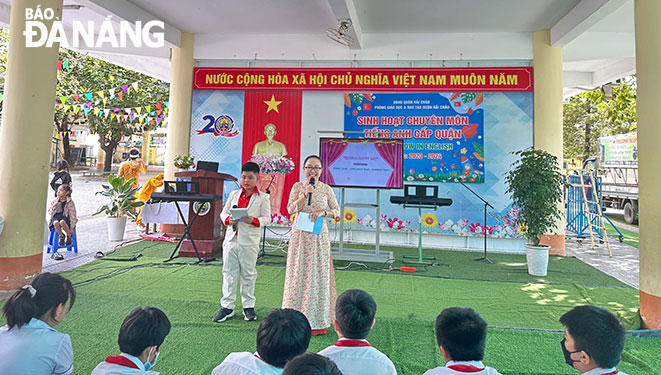To make English second language in schools
Conclusion No. 91-KL/TW of the Politburo on continuing to implement Resolution No. 29-NQ/TW of the Party Central Committee (11th tenure) stated the task of focusing on improving foreign language proficiency of pupils and students, gradually making English the second language in schools. The University of Da Nang (UD) has been making efforts to achieve this goal.
 |
| Pupils and teachers participate in district-level English professional activities at Phan Dang Luu Primary School, Da Nang. Photo: DOAN HAO LUONG |
Implementing Resolution No. 29-NQ/TW of the Party Central Committee (11th tenure) on fundamental and comprehensive innovation of education and training, meeting the requirements of industrialization and modernization in the conditions of a socialist-oriented market economy and international integration, the UD has implemented key projects.
Included are Project 2020 (teaching and learning foreign languages in the national education system in the 2008 - 2020 period; Project 322 (training scientific and technical staff at foreign institutions using the State budget), Project 911 (now Project 89 on improving the capacity of lecturers and managers of higher education institutions to meet the requirements of comprehensive fundamental innovation in education and training in the 2019 - 2030 period.
Thanks to that, the teaching staff has mostly been trained in developed countries worldwide and students studying abroad are highly appreciated for their English proficiency, partly thanks to investment from parents, partly thanks to changing perceptions and enhancing the quality of foreign language teaching and learning.
Since the 3rd Party Congress for the 2015 - 2020 term, the UD has issued a strong policy of sending staff and lecturers for training abroad, thanks to which, up to now, 50% of the lecturers at the UD have possessed doctoral degrees or higher, especially more than 70% recorded at the University of Science and Technology – UD, about twice the national average.
Most of these lecturers have been trained in advanced countries, so they have both expertise and good foreign language skills. The UD has focused on directing member schools to promote the implementation of training programmes in English, international training cooperation, encouraging lecturers to teach their majors in English, persuading students to use documents, communicate and make presentations in English, promoting the advantages of the regional university model using shared resources, assigning the University of Foreign Language Studies to be the core in English training, promote the Viet Nam-UK Institute for Research and Executive Education (VNUK) to develop according to the international university model so that students meet the standards of foreign language competency framework.
The UD leaders said that improving the quality of English training, foreign languages as a whole for students of member universities, as well as those of the University of Foreign Language Studies (ULFS-UD) to study well a second foreign language (in addition to specialized foreign languages) is the focus and priority in the direction, creating connectivity, synchronization and positive changes.
The results are clearly shown when UD students have continuously won high prizes in regional and national competitions, typically the group of students from ULFS-UD (Tran Ngoc Bao Khanh, Nguyen Phi Thuan Nhi, Pham Le Van Phat, Le Pham Nhu Quynh and Nguyen Dang Mai Quynh) just won the first prize of the National Student Scientific Research Award 2024 organized by the Vietnamese Ministry of Education and Training with the topic: ‘ Exploring EFL Students’ Perceptions and Practices of Essential Survival Skills during Hazards at ULFS-UD: A Project-based Approach’ (developing basic survival skills to cope with challenges and hazards such as electric shock, fire, drowning, storms and floods through multimedia social media).
For three consecutive years (from 2022 to present), UD students have won first prize in the national English competition Star Awards in Da Nang and the Central Highlands, demonstrating their ability to present and eloquently speak in English on social topics, conveying educational and humanistic messages.
In order for English to become the second language in schools, it is necessary to create conditions to remove some bottlenecks facing for universities so as to promote international cooperation. For example, assigning and authorizing universities to organise international conferences without having to ask for permission from the Ministry of Education and Training or being flexible in procedures for receiving international sponsorship. This is the solution to unlock resources and promote advantages when UD annually hosts dozens of international conferences and events. This creates an environment to develop English proficiency for students and lecturers, aiming at global citizens, as well as meeting practical requirements in the context of a fiercely competitive labour market.
Reporting by QUANG MINH - Translating by A.THU